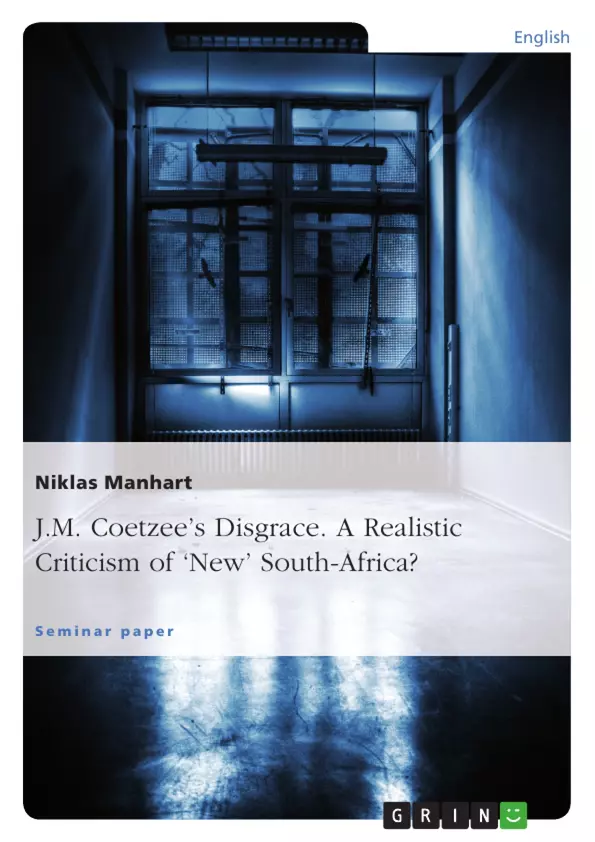Ever since its publication in 1999, J.M. Coetzee’s award-winning novel Disgrace has stirred up a lot of controversy. Its negative depiction of blacks has been seen as an endorsement of white racist stereotypes. In this essay, I first analyze the degree of realism in Disgrace. Second, I assess how Disgrace can be read as a criticism of "New South Africa", a decade after the dismantling of the Apartheid system
Inhaltsverzeichnis (Table of Contents)
- Introduction: A troubled novel
- Why realism?
- Coetzee, realism and resistance writing
- The fictional mode of Disgrace
- Lurie's non-confessions
- The hearing at the university
- The Truth and Reconciliation Commission (TRC)
- The apology to Melanie's father
- The rape of Lucy
- The deceptively idyllic rural life
- The multiple juxtaposition of Lurie and Lucy
- Possible explanations for Lucy's behavior
- Further criticisms
- Retribution and redistribution
- Rationalization
Zielsetzung und Themenschwerpunkte (Objectives and Key Themes)
This essay aims to analyze J.M. Coetzee's 1999 novel *Disgrace* in relation to its portrayal of post-apartheid South Africa. It focuses on the novel's use of realism, examining the degree to which it depicts the social and political realities of the time. The essay also analyzes the complexities of the main characters' actions and motivations, particularly in relation to the themes of race, gender, and justice. Key themes explored in the essay include:- The role of realism in Coetzee's work and its implications for understanding post-apartheid South Africa
- The ambiguity of David Lurie's actions and motivations, including his sexual encounters and his involvement in the aftermath of the rape of his daughter
- The complex relationship between the past and present in South Africa, particularly in relation to the legacies of colonialism and apartheid
- The challenges of achieving justice and reconciliation in a post-conflict society
- The diverse responses to the novel, including criticism for its perceived negativity towards post-apartheid South Africa and praise for its unflinching portrayal of social realities
Zusammenfassung der Kapitel (Chapter Summaries)
The introduction explores the controversy surrounding *Disgrace* since its publication, highlighting its polarized reception and the various interpretations of its message. It introduces the essay's central objectives: analyzing the novel's realism and its depiction of post-apartheid South Africa.
The second section delves into the notion of realism in Coetzee's work, contrasting his previous writing with the more realistic approach of *Disgrace*. It explores the reasons behind this shift, highlighting the changing socio-political landscape and Coetzee's evolving concerns.
The third section analyzes Lurie's actions and motivations, particularly his non-confessions and the events that lead to his dismissal from the university. It examines the novel's treatment of the Truth and Reconciliation Commission (TRC) and the challenges of achieving reconciliation in a post-apartheid society.
The fourth section focuses on the rape of Lucy, exploring its significance in the context of the novel's overall themes. It considers the relationship between Lurie and his daughter, and the complexities of their individual experiences in the aftermath of the rape.
The fifth section delves into further criticisms of the novel, examining the themes of retribution and redistribution in post-apartheid South Africa. It analyzes the various perspectives on the novel's message, highlighting the diverse interpretations of its portrayal of social realities.
Schlüsselwörter (Keywords)
The main keywords and focus topics of this essay include post-apartheid South Africa, literary realism, J.M. Coetzee, *Disgrace*, David Lurie, Lucy, race, gender, justice, reconciliation, criticism, and interpretation. The essay focuses on the complexities of post-apartheid South African society, the role of literature in reflecting and interpreting social realities, and the challenges of achieving reconciliation in a post-conflict society.- Citation du texte
- Niklas Manhart (Auteur), 2007, J.M. Coetzee’s Disgrace. A Realistic Criticism of ‘New’ South-Africa?, Munich, GRIN Verlag, https://www.grin.com/document/188993



